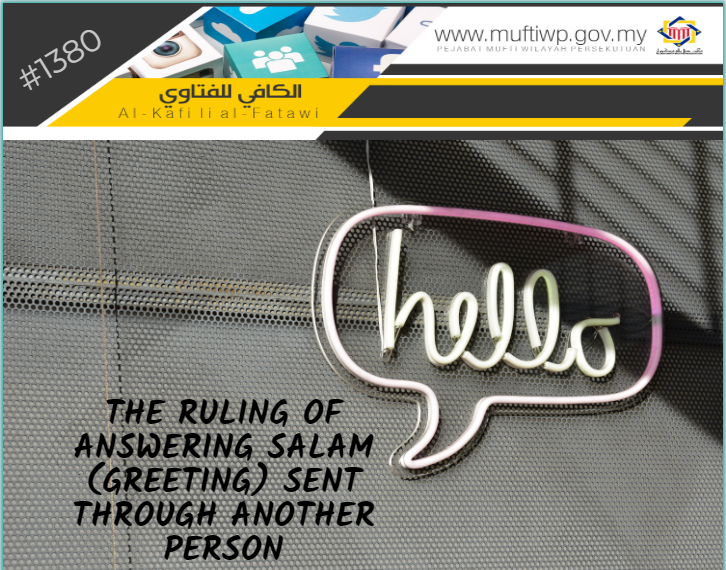Question:
Assalamualaikum SS Dato’ Seri Mufti. What is the ruling of answering salam sent to us from another person and how should we answer it?
Answer:
Alhamdulillah, praise and thanks to Allah for the many countless blessings He has blessed us all with. Blessings and salutations to the Prophet Muhammad PBUH, his wives, his family, companions and all those that follow his teachings to the day of judgement.
Basically, the practise of sending salam has been done from the time of the Prophet PBUH. Once, a companion of the Prophet PBUH asked his son to meet the Prophet PBUH and send the Prophet PBUH his salam, his son said:
فَأَتَيْتُهُ فَقُلْتُ إِنَّ أَبِى يُقْرِئُكَ السَّلاَمَ. فَقَالَ : عَلَيْكَ وَعَلَى أَبِيكَ السَّلاَمُ
“My father sends you a greeting. He said: Upon you and upon your father be peace.”
Musnad Ahmad (23104), Sunan Abu Daud (2936) and al-Baihaqi in al-Sunan al-Kubra (13430)
The author of 'Aun al-Ma'bud wrote in Fath al-Wadud: “This shows that the Prophet PBUH answered the salam sent to him.” (See 'Aun al-Ma'bud, 14/97)
Among others, it is recorded that Gabriel AS (an angel) send salam to Aisyah R.Amha through the Prophet PBUH because Aisyah could not see Gabriel. Saidatina Aisyah R.Anha said:
قَالَ رَسُولُ اللَّهِ -صلى الله عليه وسلم- « يَا عَائِشَةُ هَذَا جِبْرِيلُ يَقْرَأُ عَلَيْكِ السَّلاَمَ ». فَقُلْتُ وَعَلَيْهِ السَّلاَمُ وَرَحْمَةُ اللَّهِ. وَهُوَ يَرَى مَا لاَ أَرَى
“Allah's Messenger (ﷺ) said, "O `Aisha! This is Gabriel sending his greetings to you." I said, "Peace, and Allah's Mercy be on him (Gabriel). You see what we do not see." (She was addressing Allah's Apostle).”
Sahih al-Bukhari (3217) and Sahih Muslim (6457)
In another narration from Imam Ahmad, Saidatina Aisyah R.Anha answered the salam as the following:
عَلَيْكَ وَعَلَيْهِ السَّلَامُ وَرَحْمَةُ اللهِ وَبَرَكَاتُهُ
"And upon him be peace and the mercy of Allah and His blessings,”
Musnad Ahmad (24857)
Imam Nawawi explained the hadith from Aisyah in the above Muslim narration, saying: “Answering salam such as this is an immediate obligation. The same when he receives the salam on paper (letter) from a faraway person, it is obligatory for him to utter his answer immediately when he reads it.” (See al-Minhaj fi Syarh Sahih Muslim Ibn al-Hajjaj, 15/211)
Imam Nawawi also said in al-Majmu’: “al-Salam 'alaik to so and so, or a person writing a letter sending his salam in it for the recipient, or a person sending a person saying to him: Send my salam to so and so,” Then, when the letter or person sent reached him, he is obligated to answer the salam immediately.” (See al-Majmu’ Syarh al-Muhazzab, 4/594)
Thus, it is clear that when a person arrives and send salam to us, we should answer it immediately.
It is also sunnah for us to reply the salam to the messenger of the salam. Imam Nawawi said: It is sunnah to reply the salam of the messenger together with the person sending the salam by saying: “وَعَلَيْكَ وَعَلَيْهِ السَّلَامُ وَرَحْمَةُ اللهِ وَبَرَكَاتُه” which means: And upon you (the messenger of the salam) safety and the mercy of Allah and His blessings. This is mentioned in a hadith in Sunan Abi Daud, its isnad is weak, but fadhail hadiths are practised even when the hadith is weak.” (See al-Majmu’ Syarh al-Muhazzab, 4/594)
Conclusion
From the above discussion, it can be concluded:
- When we receive salam from anyone, it is obligatory for us to answer it immediately.
- Furthermore, it is sunnah for us to answer the salam mentioning the messenger of the salam.
We close this issue by reminding us all with the words of Allah SWT:
وَإِذَا حُيِّيتُم بِتَحِيَّةٍ فَحَيُّوا بِأَحْسَنَ مِنْهَا أَوْ رُدُّوهَا
“And when you are greeted with a greeting, greet [in return] with one better than it or [at least] return it [in a like manner].”
Surah al-Nisa’ (86)
Imam al-Qurtubi said: “When words of honour such as asking for invocation or commendation and also salam are offered to you; the origin of tahiyyat is supplication in life and tahiyyat for Allah SWT means salam and safety from any disaster. Al-Kisa’ie defines tahiyyat for Allah as blessings.” (See al-Jami' li Ahkam al-Quran, 5/297)
May Allah SWT give us knowledge and understanding in fulfilling His every commandment. Amin.


